Hannah Arendt (1906-1975) est considérée comme l'une des plus grandes philosophes du XXe siècle. On compte parmi ses grands textes Les Origines du totalitarisme, L'Humaine Condition et, plus récemment, Ecrits juifs.
Responsibility and Judgment
Par :Formats :
Disponible dans votre compte client Decitre ou Furet du Nord dès validation de votre commande. Le format ePub protégé est :
- Compatible avec une lecture sur My Vivlio (smartphone, tablette, ordinateur)
- Compatible avec une lecture sur liseuses Vivlio
- Pour les liseuses autres que Vivlio, vous devez utiliser le logiciel Adobe Digital Edition. Non compatible avec la lecture sur les liseuses Kindle, Remarkable et Sony
- Non compatible avec un achat hors France métropolitaine
 , qui est-ce ?
, qui est-ce ?Notre partenaire de plateforme de lecture numérique où vous retrouverez l'ensemble de vos ebooks gratuitement
Pour en savoir plus sur nos ebooks, consultez notre aide en ligne ici
- Nombre de pages336
- FormatePub
- ISBN978-0-307-54405-6
- EAN9780307544056
- Date de parution02/04/2009
- Protection num.Adobe DRM
- Taille2 Mo
- Infos supplémentairesepub
- ÉditeurSchocken
Résumé
Each of the books that Hannah Arendt published in her lifetime was unique, and to this day each continues to provoke fresh thought and interpretations. This was never more true than for Eichmann in Jerusalem, her account of the trial of Adolf Eichmann, where she first used the phrase "the banality of evil." Her consternation over how a man who was neither a monster nor a demon could nevertheless be an agent of the most extreme evil evoked derision, outrage, and misunderstanding.
The firestorm of controversy prompted Arendt to readdress fundamental questions and concerns about the nature of evil and the making of moral choices. Responsibility and Judgment gathers together unpublished writings from the last decade of Arendt's life, as she struggled to explicate the meaning of Eichmann in Jerusalem. At the heart of this book is a profound ethical investigation, "Some Questions of Moral Philosophy"; in it Arendt confronts the inadequacy of traditional moral "truths" as standards to judge what we are capable of doing, and she examines anew our ability to distinguish good from evil and right from wrong.
We see how Arendt comes to understand that alongside the radical evil she had addressed in earlier analyses of totalitarianism, there exists a more pernicious evil, independent of political ideology, whose execution is limitless when the perpetrator feels no remorse and can forget his acts as soon as they are committed. Responsibility and Judgment is an essential work for understanding Arendt's conception of morality; it is also an indispensable investigation into some of the most troubling and important issues of our time.
The firestorm of controversy prompted Arendt to readdress fundamental questions and concerns about the nature of evil and the making of moral choices. Responsibility and Judgment gathers together unpublished writings from the last decade of Arendt's life, as she struggled to explicate the meaning of Eichmann in Jerusalem. At the heart of this book is a profound ethical investigation, "Some Questions of Moral Philosophy"; in it Arendt confronts the inadequacy of traditional moral "truths" as standards to judge what we are capable of doing, and she examines anew our ability to distinguish good from evil and right from wrong.
We see how Arendt comes to understand that alongside the radical evil she had addressed in earlier analyses of totalitarianism, there exists a more pernicious evil, independent of political ideology, whose execution is limitless when the perpetrator feels no remorse and can forget his acts as soon as they are committed. Responsibility and Judgment is an essential work for understanding Arendt's conception of morality; it is also an indispensable investigation into some of the most troubling and important issues of our time.
Each of the books that Hannah Arendt published in her lifetime was unique, and to this day each continues to provoke fresh thought and interpretations. This was never more true than for Eichmann in Jerusalem, her account of the trial of Adolf Eichmann, where she first used the phrase "the banality of evil." Her consternation over how a man who was neither a monster nor a demon could nevertheless be an agent of the most extreme evil evoked derision, outrage, and misunderstanding.
The firestorm of controversy prompted Arendt to readdress fundamental questions and concerns about the nature of evil and the making of moral choices. Responsibility and Judgment gathers together unpublished writings from the last decade of Arendt's life, as she struggled to explicate the meaning of Eichmann in Jerusalem. At the heart of this book is a profound ethical investigation, "Some Questions of Moral Philosophy"; in it Arendt confronts the inadequacy of traditional moral "truths" as standards to judge what we are capable of doing, and she examines anew our ability to distinguish good from evil and right from wrong.
We see how Arendt comes to understand that alongside the radical evil she had addressed in earlier analyses of totalitarianism, there exists a more pernicious evil, independent of political ideology, whose execution is limitless when the perpetrator feels no remorse and can forget his acts as soon as they are committed. Responsibility and Judgment is an essential work for understanding Arendt's conception of morality; it is also an indispensable investigation into some of the most troubling and important issues of our time.
The firestorm of controversy prompted Arendt to readdress fundamental questions and concerns about the nature of evil and the making of moral choices. Responsibility and Judgment gathers together unpublished writings from the last decade of Arendt's life, as she struggled to explicate the meaning of Eichmann in Jerusalem. At the heart of this book is a profound ethical investigation, "Some Questions of Moral Philosophy"; in it Arendt confronts the inadequacy of traditional moral "truths" as standards to judge what we are capable of doing, and she examines anew our ability to distinguish good from evil and right from wrong.
We see how Arendt comes to understand that alongside the radical evil she had addressed in earlier analyses of totalitarianism, there exists a more pernicious evil, independent of political ideology, whose execution is limitless when the perpetrator feels no remorse and can forget his acts as soon as they are committed. Responsibility and Judgment is an essential work for understanding Arendt's conception of morality; it is also an indispensable investigation into some of the most troubling and important issues of our time.






















